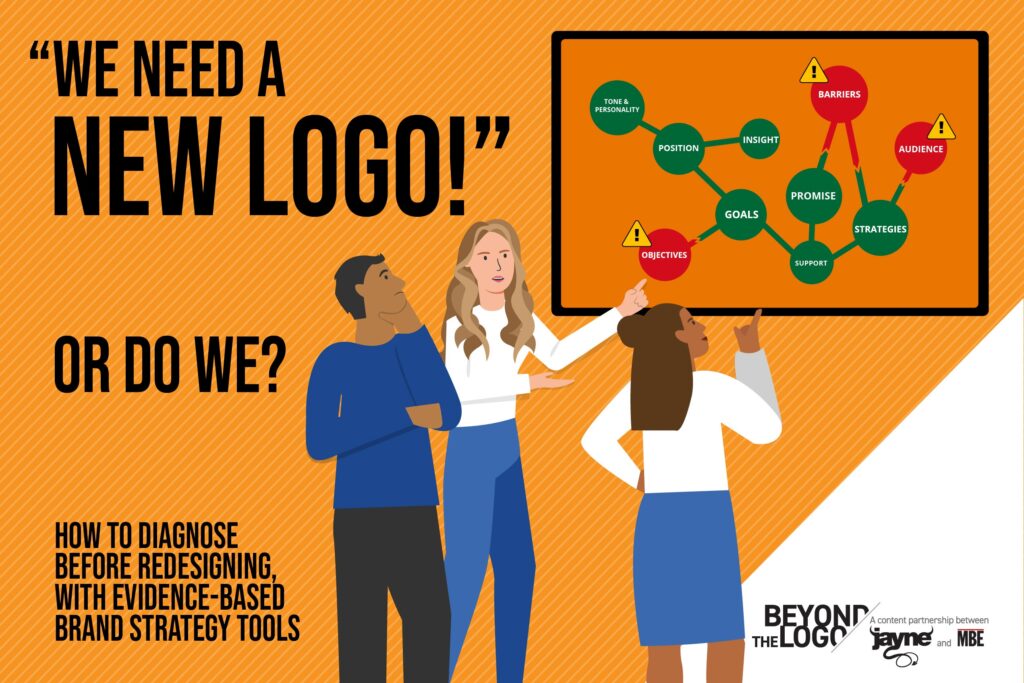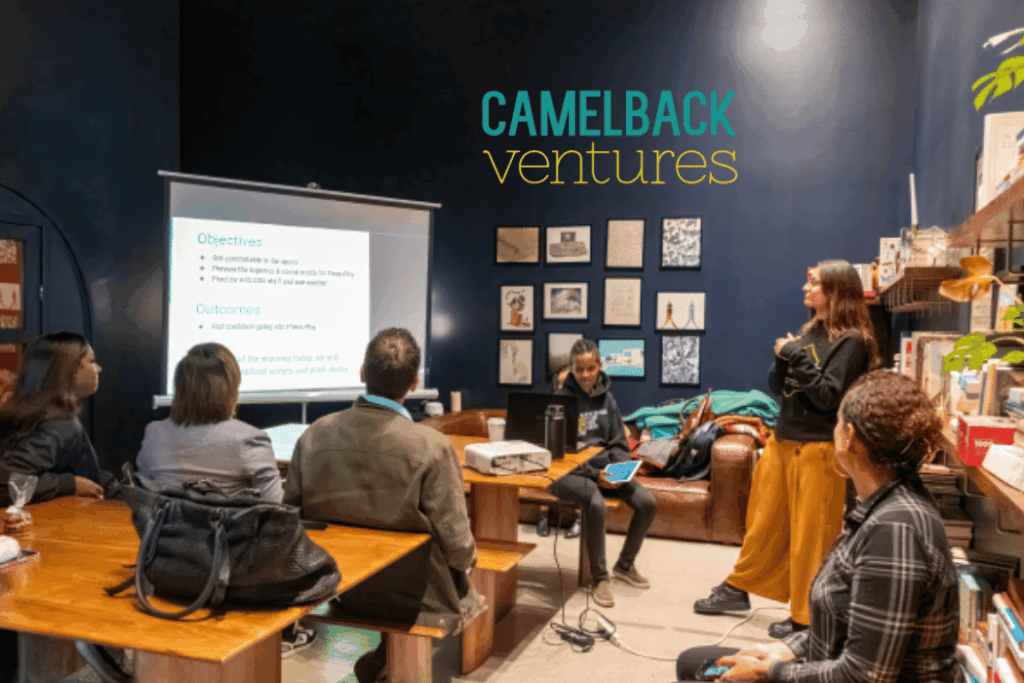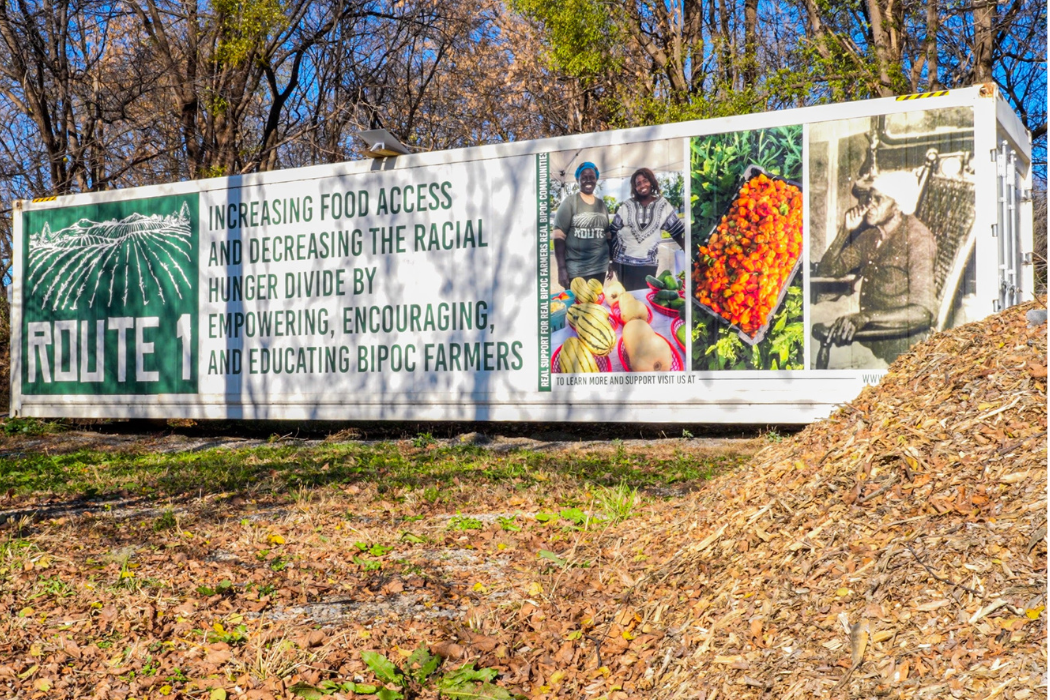
In the heart of Minnesota, a revolution in urban agriculture is taking root inside an unlikely vessel: a shipping container. This isn’t just any container—it’s a sophisticated hydroponic farm capable of producing 200 pounds of fresh produce weekly, equivalent to the yield of 2.5 acres of traditional farmland. At the helm of this innovative venture is Marcus Carpenter, founder of Route 1, whose vision extends far beyond mere food production to addressing generations of systemic inequities in American agriculture.
“During that fateful summer of 2020, I had an opportunity to take a step back, as we all did, and really think about why we were where we were in our society at that time,” Carpenter reflects. His contemplation led to a stark realization about the foundation of generational wealth in America: land ownership. This insight would become the cornerstone of a movement that’s now transforming urban agriculture and community empowerment.
Route 1 is “a hub of resources for BIPOC emerging farmer” designed to help them “navigate the path towards a profitable farming enterprise while simultaneously reducing the racial hunger divide in our nation.”
The Legacy of Loss and the Path to Renewal
The statistics tell a sobering story. Black farmers once stewarded over 16 million acres of American soil. Today, that number has dwindled to just 4.7 million acres – a loss that Carpenter estimates represents over $326 billion in generational wealth. The causes, he explains without hesitation, begin with “racism, number one.” This systematic dispossession, combined with limited knowledge and access to legal resources for land protection, has created a multi-generational impact that extends far beyond agriculture into the very fabric of community wealth and well-being.
“Imagine if we had that in our urban areas within our families,” Carpenter ponders, considering the transformative potential of that lost wealth. The magnitude of this historical injustice becomes even more striking when considering its ripple effects through generations—affecting everything from educational opportunities to health outcomes in Black communities.
But where others might see only loss, Carpenter sees opportunity. Route 1’s approach combines cutting-edge technology with community-centered solutions, creating what he calls an “Urban Agriculture and Conservation Micro Campus” (UACC). These innovative spaces are designed to do more than just grow food – they’re intended to rebuild the agricultural knowledge and community connections that were fractured over generations.
The Technology Behind the Transformation
The cornerstone of Route 1’s innovation is the freight farm, a partnership with technology company Freight Farms. These retrofitted shipping containers are marvels of modern agriculture, equipped with over 100 sensors and controlled via smartphone app. “I have an app on my phone where I can control our farm anywhere in the world,” Carpenter explains. “I can dial up the humidity, dial it down, add nutrients.”
What makes these units particularly revolutionary is their mobility and efficiency. Using just five gallons of water daily, they can be placed virtually anywhere with access to electricity and water. This flexibility allows Route 1 to bring fresh food production directly into urban food deserts and rural communities alike, addressing one of the most persistent challenges in food security: access.
The technology’s sophistication belies its accessibility. Inside these climate-controlled environments, new farmers can learn the fundamentals of agriculture while working with state-of-the-art systems. This combination of traditional agricultural knowledge and modern technology creates a unique learning environment that bridges generational gaps while preparing participants for the future of farming.
Beyond Food Production: Building a Movement
Route 1’s impact extends far beyond the impressive yield statistics. In just one year, the organization:
- Fed over 10,000 families in Minnesota
- Produced more than 70,000 pounds of food
- Supported over 90 farmers
- Created sustainable economic opportunities in underserved communities
The organization’s approach to community engagement goes beyond traditional agricultural education. Through their Seeds to Success Youth Academy, Route 1 is inspiring the next generation to see agriculture through a new lens. “We’re not trying to necessarily make them farmers,” Carpenter notes. “But we’re trying to give them just a glimpse of what could be possible around food.”
This comprehensive approach reflects a deep understanding of the interconnected nature of food systems and community well-being. By creating spaces where young people can explore careers ranging from chef to software engineer within the agricultural sector, Route 1 is expanding the traditional narrative of what it means to be involved in farming.
A Model for National Scale
The success of Route 1’s approach has attracted attention from major corporations and institutions. Partners include American Family Insurance, Toro, YouCare, and academic institutions like Tuskegee University. Dr. Olga Bolden-Tiller, dean of Agriculture at Tuskegee, serves on the organization’s board, bringing crucial academic expertise to the initiative.
This diverse coalition of supporters reflects Carpenter’s vision of breaking down traditional silos in the food system. Drawing from his 20 years of corporate experience, including roles at major companies like CA Technologies (now Broadcom) and the NBA, Carpenter has structured Route 1 to bridge gaps between different sectors of the food industry.
What makes Route 1’s model particularly powerful is its holistic approach to the food system. Rather than addressing individual components in isolation, the organization integrates:
- Food production through innovative Freight Farm technology
- Transportation and storage solutions that minimize waste
- Wholesale distribution networks that support local economies
- Retail access strategies that prioritize community needs
- Food preparation education that promotes healthy eating
- Community support systems that ensure long-term sustainability
Challenges and Opportunities
Despite its success, Route 1 faces significant challenges. Each freight farm unit costs approximately $200,000, making funding a crucial concern. However, Carpenter sees this as an investment in community transformation rather than just infrastructure. “These freight farms, they’re not cheap,” he acknowledges, “but it’s worth it.”
The organization’s growth trajectory suggests the model’s potential for national impact. From starting with just two students in their youth academy, they now have over 100 enrolled for the upcoming summer. Farmer participation has grown from zero to 92 in just two years, demonstrating the strong demand for this innovative approach to urban agriculture.
The Future of Black Agriculture
Looking ahead, Route 1’s vision centers on expanding their Urban Agriculture and Conservation Micro Campus (UACC) model into urban communities nationwide. “The next step is bringing the farm to the people,” Carpenter emphasizes. Whether in Charlotte, Chicago, Miami, or LA, these micro-centers could serve as catalysts for community renewal and economic development.
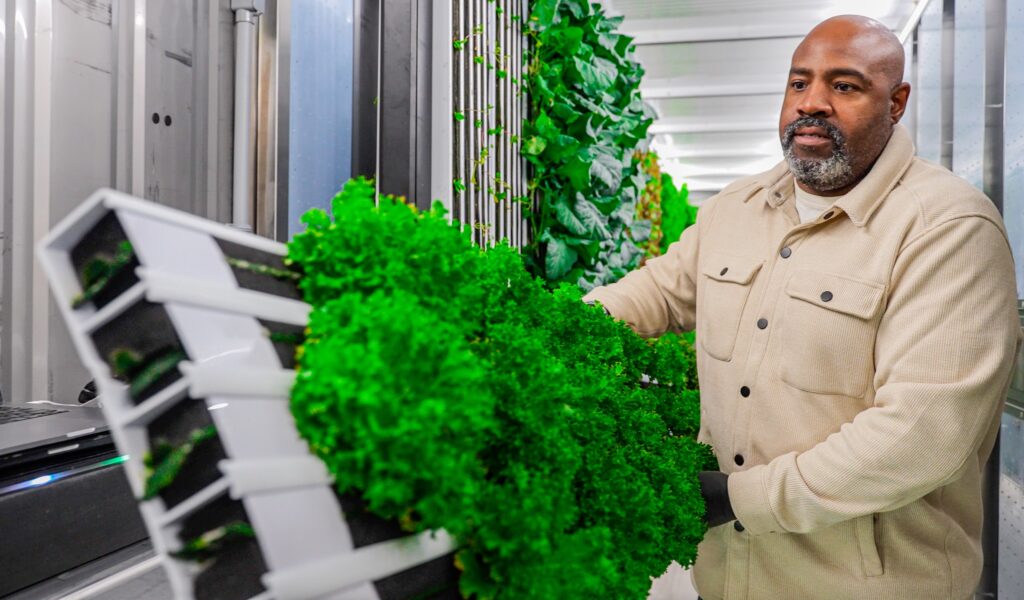
“We want to go into our urban areas and we want to take a city block, it could even be smaller than a city block, and develop these Route 1 micro campuses where we can teach our people about food, about how to grow food. We can actually grow food there on site for our neighborhoods,” Carpenter explains “But then we can also use these micro campuses as places for community gardening on the outside of the freight farm. We can have a demonstration area where we can do cover crops and talk about soil health and how to take care of the soil in our neighborhoods to bring that soil back to life.”
The organization’s expansion strategy focuses on creating sustainable food systems that are deeply rooted in local communities. Each UACC is designed to be more than just a food production facility—it’s a community hub that includes:
- Hydroponic growing spaces using Freight Farm technology
- Traditional outdoor community gardens
- Educational areas for demonstrations and workshops
- Spaces for community gatherings and events
- Demonstration areas for soil health and conservation practices
Creating Lasting Change
The impact of Route 1’s work extends beyond food security into the realm of economic justice and community empowerment. By supporting emerging farmers with business planning, crop management strategies, and market access, the organization is helping to create sustainable livelihoods while addressing food insecurity in underserved communities.
This approach to culturally relevant food production—growing foods that communities are familiar with and likely to consume—has proven particularly effective. “Studies show that if you’re eating familiar foods, you’re more likely to eat it,” Carpenter explains. This cultural sensitivity, combined with economic opportunity, creates a powerful model for community transformation.
The organization’s success in Minnesota serves as a proof of concept for what’s possible nationwide. By focusing on both immediate food needs and long-term community development, Route 1 is creating a template for sustainable urban agriculture that could be replicated across the country.
A Call to Action
For those inspired by Route 1’s mission, Carpenter emphasizes that support can take many forms. Whether through financial contributions, volunteer time, or expertise sharing, there are numerous ways to participate in this agricultural revolution. As he puts it, “Hope is not a strategy”—it takes resources, commitment, and community engagement to create lasting change.
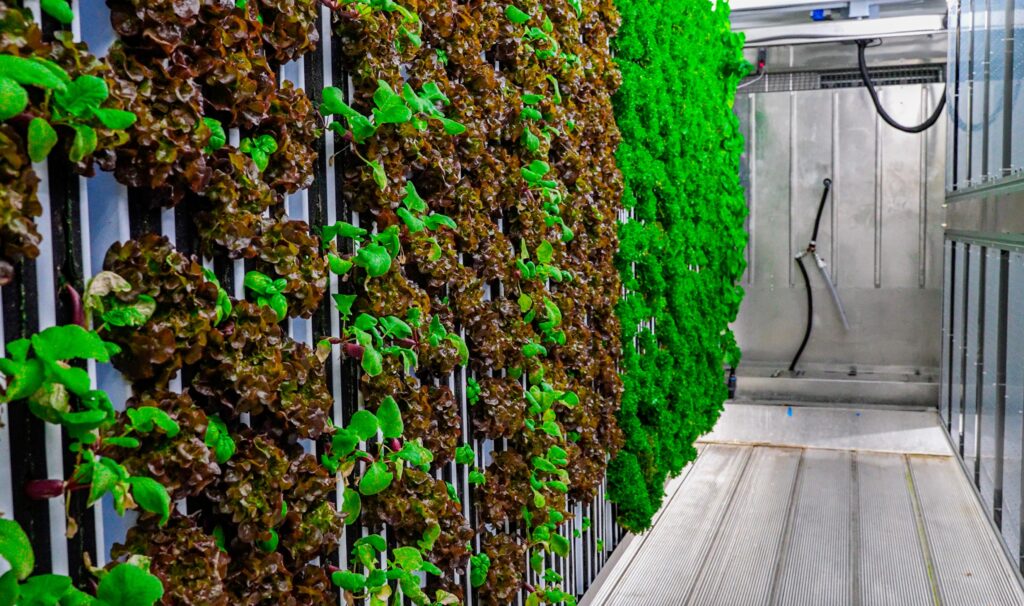
In a time of national division, Carpenter sees Route 1’s work as part of a larger movement toward healing and unity. “We really, really need to lean on and come together with those who have like-minded values with us now more than ever,” he urges. This call for collaboration extends beyond the agricultural sector to encompass anyone interested in creating more equitable and sustainable communities.
The story of Route 1 is more than a tale of agricultural innovation; it’s a blueprint for addressing historical injustices while building a more equitable future. Through the combination of cutting-edge technology, community engagement, and strategic partnerships, Carpenter and his team are demonstrating how urban agriculture can serve as a powerful tool for social and economic transformation.
As the organization continues to grow and expand its impact, it stands as a testament to what’s possible when innovation meets social justice. For communities across America grappling with food insecurity and economic disparity, Route 1’s model offers a path forward – one that honors the past while embracing the future of agriculture.
To learn more about Route 1’s work or to contribute to their mission, visit route1mn.org.






